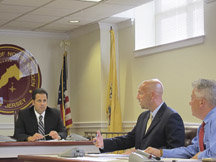While the township was able to hold a hearing for the 2011 budget, they were unable to adopt it because the state has yet to release the final public employee pension amount North Bergen must pay – the first time this has ever happened, officials said.
At the Sept. 8 Board of Commissioners meeting no one spoke during the public hearing for the township’s $79.2 million 2011 fiscal budget, which will cover spending from July 1, 2010 to June 30, 2011. Property owners will experience a 3.9 percent tax increase, an average $249 increase on the typical residence. However, taxpayers who are losing the Regional Efficiency Aid Program (REAP) after the state ended the tax rebate this year will also see an additional $170 increase. The program equalized the tax burden among those towns participating in the North Hudson Regional Fire and Rescue company.
Normally North Bergen introduces its budget by Aug. 10 and then adopts it after a public hearing before Sept. 10, in accord with state statutes, said Town Administrator Christopher Pianese.
‘[Our] budget should be adopted right now.’ – Nicholas Sacco
________
“It just seems that we did everything on time according to what the schedule is and the state is late with the numbers,” said Mayor Nicholas Sacco after the meeting. “The state should have these numbers in their budget. [Our] budget should be adopted right now.”
Will contributions increase?
Pianese said they estimated a 10 percent increase from last year, with a total contribution to both the Public Employees’ Retirement System (PERS) and the Police and Firemen’s Retirement System (PFRS) at $3.5 million, a more than $300,000 increase from last year.
“The question becomes, are the municipality’s bills going to take on a larger burden and the state won’t have as a large of a burden,” said Pianese.
Gov. Christopher Christie has mentioned pension reform at his town hall meetings, such as one in Wayne this week, according to published reports. It is believed that he will announce changes to the system in the next few weeks.
Pianese said that while an independent actuary, or a business professional who analyses risk and uncertainty, is suppose to help decide what towns and the state contribute, there is some uncertainty of what they will have to contribute now.
“The state is holding up our budget because they don’t know what the state’s pension numbers are going to be,” said Pianese.
He said that they used a 10 percent rise in pension contributions in the budget expecting that the actual increase from the state would be less than that. If the state increases past that percentage, they will have to rework their budget.
Forced to reintroduce UEZ applications
North Bergen officials hope that some costs of their police and department of public works operations will be covered through Urban Enterprise Zone (UEZ) funding, as they have been in the past, but once again they were forced to reapply to the state UEZ Authority and are unsure if the monies, frozen by the state, will be allocated to them.
Two resolutions were passed on Aug. 25, but at last week’s meeting the commissioners reduced their application and reapplied.
Urban Enterprise Zones were urban business districts empowered to collect 3.5 percent in sales taxes, and these funds were made available to those municipalities for beautification projects and salaries for government workers. But the Christie administration froze the payments to the municipalities earlier this year in response to the state budget deficit.
In one resolution, they asked the state for $708,671, as opposed to the original $709,474 request, for police officers salaries and benefits.
Through another resolution North Bergen applied for $368,566, as opposed to $370,919, for DPW salaries.
Pianese said that previously there was a 35 percent cap on what could be spent on police and fire services from their UEZ sales tax reimbursement, but that the state law never applied to DPW workers in their UEZ zone, which was previously funded 100 percent. He said that Christie has made a policy that allows the state to place this cap across the board, but that it is not found in legislation.
Pianese said that the township was asking $1.2 million less than usual in funding this year.
“If this continues, this will be the end of the UEZ zones,” said Sacco. “Every UEZ zone doesn’t have its own pot of money. Their overall weapon is if we disagree, the governor can veto all of our projects.”
Passes new OPRA charges
The commissioners passed an ordinance that will update their Open Public Records Act request charge.
A Hudson County Appellate Court decision recently decided that government record reproductions must only cost the “actual cost” to reproduce them.
Under the ordinance, letter-sized documents would be $0.05 per page, while legal-sized pages would cost $0.07. Other copying records, such as company discs, photographs, and map-sized paper, would be determined at the time of copying.
Tricia Tirella may be reached at TriciaT@hudsonreporter.com.
